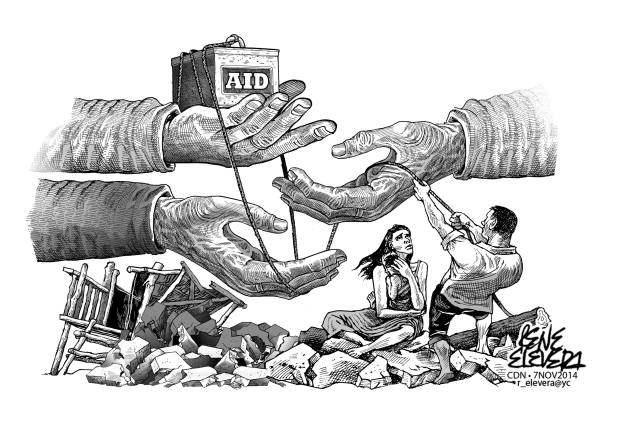
It is now glaring how actual rehabilitation accomplishments do not match official promises made by politicians.
In Cebu, where 15 northern towns and the city of Bogo were leveled by supertyphoon Yolanda (International name: Haiyan), private sector assistance proved more efficient and faster than government’s.
In building permanent shelters alone, a year after the disaster, government has yet to build permanent shelters out of the target of 24,000 units.
Despite the release, albeit late, of the budget for permanent shelters last week, 20,000 of these planned housing units for victims of Yolanda still have no land or relocation site.
Food and other basic needs remain scarce for many survivors whose livelihood were swept away by the winds and rain.
The list could be long while the rhetoric of ‘experts’ and justifications of bureaucrats could be longer.
A year after the country became the focus of a massive global humanitarian mission, the realities expose the underbelly of our flawed state.
The Washington-based political think-tank Brookings Institution characterizes weak states as countries that “lack the capacity and/or will to perform core functions of statehood effectively… weak states are unable or unwilling to provide essential public services.”
Although the country has visible, highly educated government leaders, characteristic of our weak state is the inability of government to transform written policies into public services.
Should these become actual and tangible public services, the farther the community is from the capital, the pie becomes smaller and quality of service is greatly diminished.
We have to shape up.
Based on findings of the 5th Assessment Report of the International Panel on Climate Change released in Copenhagen on Nov. 1, 2014, “Climate change will amplify existing risks and create new risks for natural and human systems. Risks are unevenly distributed and are generally greater for disadvantaged people and communities in countries at all levels of development.”
With the way things are moving, one of the biggest lessons of those who survived Yolanda is that people only have each other after a calamity.
It would be a near-miracle if government aid arrives on time. Resiliency resides in the people.
On this day of reckoning, we hope to see government systems becoming more responsive. And hope that the red tape that Yolanda’s howling winds failed to cut through will finally snap.
Disclaimer: The comments uploaded on this site do not necessarily represent or reflect the views of management and owner of Cebudailynews. We reserve the right to exclude comments that we deem to be inconsistent with our editorial standards.
